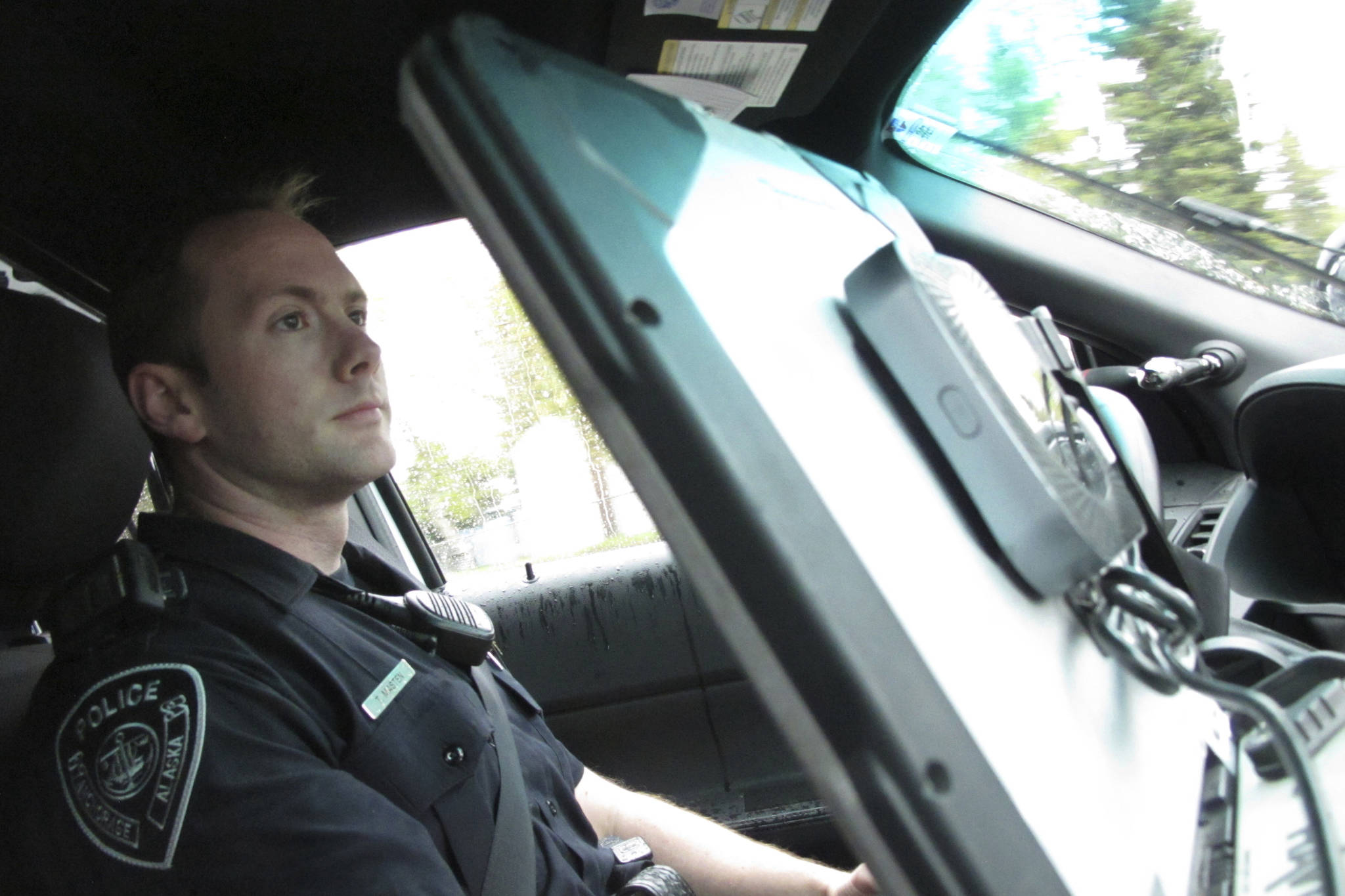ANCHORAGE — The police chief of Alaska’s largest city hurried out of the department’s glass building after the ground began to shake. Phone lines jammed and even police radios were spotty after a major earthquake, but his cellphone was recently equipped with a national wireless network dedicated to first responders.
Anchorage Police Chief Justin Doll was able to reach other officials who had the new high-speed connection after the 7.1 magnitude quake last year caused widespread damage.
It proved to be a trial run in Alaska for the FirstNet network, which Doll and other commanders had just signed on to test with their personal cellphones. The crucial calls made possible by FirstNet helped first responders set up an emergency operations center and coordinate the response to the Nov. 30 earthquake.
“It was just random chance that we had started sort of testing this a little bit right before the earthquake happened,” Doll said. “I felt a lot more confident rolling it out to the whole agency after we had that kind of trial by fire with the earthquake with just a few phones. I was like, ‘This actually works.’”
Anchorage police officially opted in to the service in January, joining thousands of public safety agencies nationwide that can use the connection during emergencies and for everyday work like communicating by smartphone, routing officers to calls and looking up suspect information in the field. Agencies also can tie the network to apps, including a push-to-talk option that turns cellphones into high-tech walkie-talkies.
In Alaska, the network is seen as an emerging tool to connect emergency responders in a massive state with scores of tribal villages far removed from roads. High-speed internet has been built up in remote areas in recent years, but connecting rural communities is still a significant challenge, even with FirstNet.
The network is secure, encrypted and off limits to the public. But it has raised concerns among media advocates that the secrecy shields police and others from scrutiny as more agencies cut access to their traditional radio communications.
Both FirstNet and AT&T, which runs the high-speed system, say it’s up to subscribers to open aspects of the network. The communications giant didn’t know any agencies that have done so.
Launched last year, the network was established by Congress in 2012 after the Sept. 11 terrorist attacks, when some police and fire departments couldn’t communicate over incompatible radio systems.
The First Responder Network Authority, an independent federal entity, oversees it with AT&T, which plans to invest $40 billion over its 25-year government contract.
The U.S. was the first to roll out a government-backed wireless network for first responders. Nations like Australia, South Korea, Canada, New Zealand and the United Kingdom are studying FirstNet as they look to create similar services, spokeswoman April Ward.
Verizon has rolled out a similar service for first responders not tied to the government but would not say how many agencies have signed up. More than 7,250 departments nationwide have joined FirstNet, AT&T said.
“I would say it’s the most important network in our country because it’s serving our first responders who are taking care of us every day,” said Chris Sambar, AT&T’s senior vice president for FirstNet.
More than half of the system has been completed, Sambar said.
In Alaska, the five-year goal is to build the network to cover more than 90% of the population, but that still amounts to less than half of the state’s far-flung tribal lands, according the FirstNet plan for Alaska. A half dozen rural hubs for scores of villages will be covered.
For now, nothing replaces Alaska’s mobile radio network, said John Rockwell, a state official who worked on the plan.
“I really believe in FirstNet,” he said. “It’s just not there yet.”
In cities like Anchorage, police have issued FirstNet-linked cellphones to officers and equipped laptops in patrol cars with mobile hotspots.
During a recent shift, Anchorage Officer T. Scott Masten used the network to look up photos that confirmed the identity of a man found sleeping in a car in a church parking lot. Previously, officers would have to drive to a substation to get that information.
“It makes my job easier; makes it much more efficient,” Masten said.
In Seattle, firefighters use FirstNet for dispatch and for transmitting patient health care information, among other things. Port St. Lucie, Florida, police use it on multiple devices with no failures yet, Police Chief Jon Bolduc said. He’s interested to see how it holds up in an emergency.
The small community of Whiteville, North Carolina, lost all connections except for FirstNet when Hurricane Florence hit last September, city emergency manager Hal Lowder said.
Even FirstNet started slowing down when officials tried to send large amounts of data, so they turned to an option available to all subscribers: equipment that turns a satellite signal into an LTE cell tower.
Whiteville officials relied on the push-to-talk app to communicate when all other systems were down. Lowder said the app doubles as a patrol radio system — at a fraction of the cost.
“It worked perfectly, even at slow speeds,” he said.
FirstNet isn’t urging responders to give up traditional radios, but that’s the direction the market is heading, CEO Ed Parkinson said.
There’s already a trend toward silencing police radios for the public. A growing number of agencies, including Anchorage police, have cut access to scanner radio traffic, citing safety concerns. The move eliminates a traditional resource and oversight tool for journalists and others.
FirstNet’s lack of public scrutiny is raising concerns about further erosion to freedom of information rights.
J. Alex Tarquinio, president of the Society of Professional Journalists, believes a government-sanctioned service should include a portion that’s open to the media.
“The government has an obligation — because this is a public service — to find a way to provide that information to journalists, so journalists can continue to cover incidents and emergency response in a timely way,” Tarquinio said.
• By RACHEL D’ORO, Associated Press

